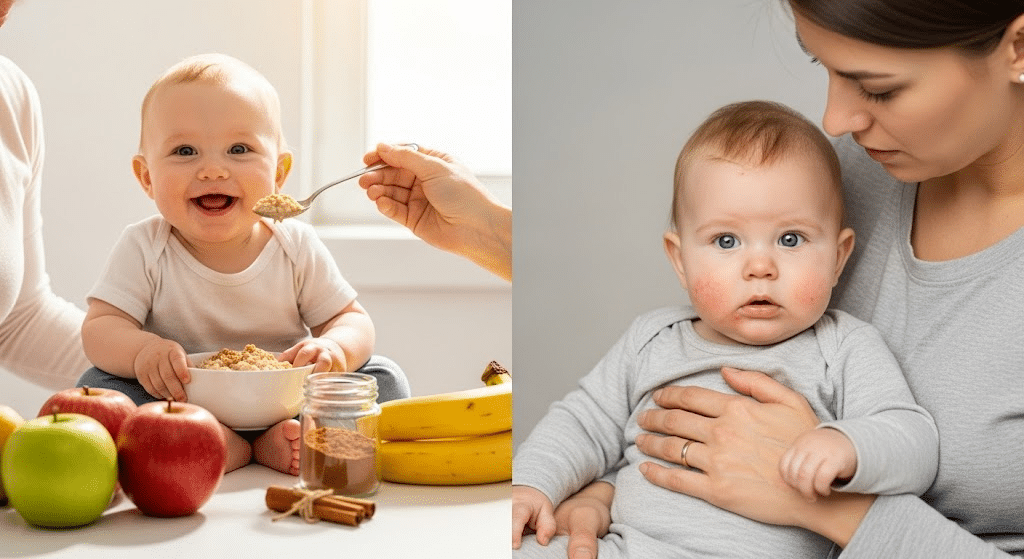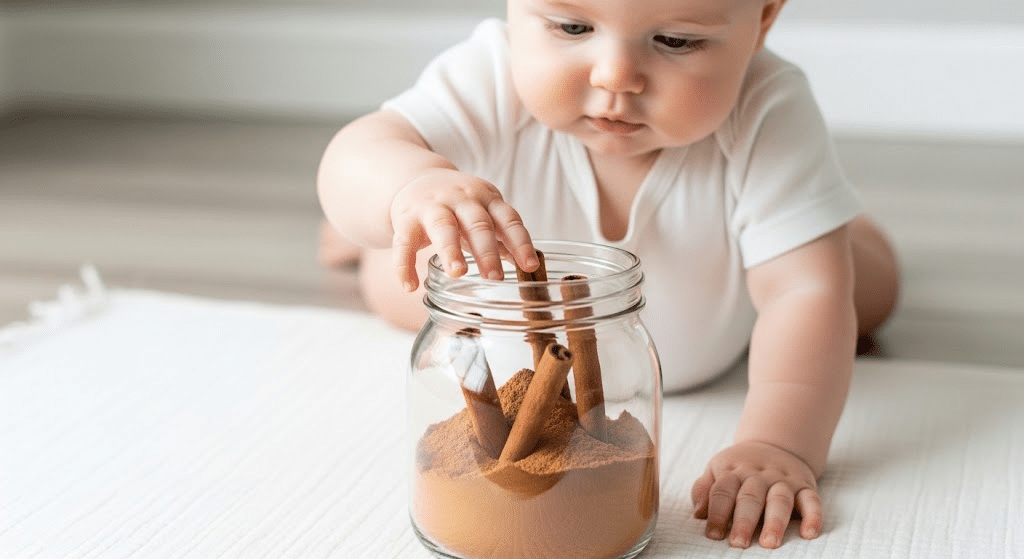New parents often worry about what spices they can safely add to their baby’s food. Cinnamon sits on many kitchen shelves, and its sweet aroma makes it seem like a perfect addition to baby meals.
But can babies have cinnamon in their diet?
Many parents find that introducing spices too early might cause digestive issues or allergic reactions. You want to give your little one flavorful foods, but safety comes first. This blog will show you when and how to introduce cinnamon to your baby safely.
You’ll learn about the right age to start, proper amounts, and warning signs to watch for.
Is Cinnamon Safe for Babies?
Cinnamon is generally safe for babies when used in small amounts.
This warm spice contains antioxidants and has anti-inflammatory properties that can benefit your little one. Many parents successfully introduce cinnamon without any problems.
However, there are some important safety concerns to keep in mind. Cinnamon can cause skin irritation if it touches your baby’s sensitive skin directly. Never give your baby cinnamon powder by itself, as it can cause choking or breathing problems.
Some babies might be allergic to cinnamon, though this is rare. Watch for signs like rashes, vomiting, or difficulty breathing after introducing it. Also, avoid cinnamon if your baby has a history of food allergies or a sensitive stomach.
Babies with acid reflux should be extra careful, as cinnamon might worsen their symptoms. Always start with tiny amounts mixed into other foods.
When Can Babies Have Cinnamon

Most pediatricians agree that babies can start having cinnamon around 6 months of age. This timing matches when babies typically begin eating solid foods.
At this stage, their digestive systems are more developed and can handle mild spices better.
However, every baby develops differently. Some infants might be ready for cinnamon at 6 months, while others need to wait until 8 or 9 months. Watch how your baby reacts to new foods before adding spices.
The question of whether can babies eat cinnamon depends on your child’s individual development. Start with tiny amounts mixed into familiar foods like oatmeal or mashed bananas. This approach helps you monitor any reactions while introducing new flavors.
Always check with your pediatrician before adding any new spice to your baby’s diet. They know your child’s health history best.
How to Introduce Cinnamon to A Baby’s Diet
The best time to introduce cinnamon is after your baby has tried several single-ingredient foods successfully. Wait until they’re comfortable with basic fruits, vegetables, and grains before adding spices.
Start Small and Simple
Begin with just a tiny pinch of ground cinnamon mixed into foods your baby already enjoys. Applesauce, mashed sweet potato, or oatmeal work well as first options. This method helps you see how your baby reacts while keeping familiar flavors.
You can also try mixing cinnamon into mashed bananas or yogurt for babies over 6 months.
The key is using such a small amount that you can barely taste it yourself. Think of it as adding a hint of flavor rather than making the food taste strongly of cinnamon.
The Three-Day Rule
Follow the same rule you use for other new foods. Offer cinnamon for three consecutive days, observing for any reactions. If your baby shows no signs of allergies or digestive upset, you can continue using it. During these three days, keep a food diary.
Note what your baby ate, how much they consumed, and any changes in their mood, sleep, or diaper contents. This record helps you spot patterns if problems arise later.
Many parents wonder can babies have cinnamon in different forms. Stick to ground cinnamon rather than cinnamon sticks or oils, which are too strong for babies.
Cinnamon extract and cinnamon sugar should also be avoided during the first year.
Pro Tip: Mix cinnamon with naturally sweet foods first. This helps babies accept the new flavor more easily than adding it to plain or savory dishes.
Health Benefits and Potential Risks of Cinnamon for Babies

Understanding both the benefits and risks helps parents make informed decisions about adding cinnamon to their baby’s diet. While this spice offers some health advantages, it’s essential to use it carefully with young children.
Health Benefits of Cinnamon for Babies
Cinnamon contains several compounds that may benefit your baby’s health when used in appropriate amounts. This spice is rich in antioxidants, which help protect cells from damage. It also has anti-inflammatory properties that might support overall health.
The antimicrobial qualities of cinnamon could help fight harmful bacteria in your baby’s digestive system.
Key potential benefits include:
- Antioxidant protection for developing cells
- Natural antimicrobial properties
- Possible digestive support
- Mild anti-inflammatory effects
Potential Risks and Side Effects
While many parents ask, Can babies have cinnamon safely, there are some risks to consider. Allergic reactions to cinnamon are rare but can occur.
Watch for signs like rashes around your baby’s mouth, swelling, or breathing difficulties.
Excessive cinnamon consumption can cause several problems:
- Stomach upset or nausea
- Mouth sores from direct contact
- Low blood pressure in large amounts
- Liver issues with prolonged high intake
Cassia cinnamon, the most common type found in stores, contains coumarin. This compound can be harmful in large quantities, potentially affecting liver function. Ceylon cinnamon contains much less coumarin but costs more.
Age-Specific Guidelines for Cinnamon
Different ages require different approaches when introducing cinnamon to your baby’s diet. Here’s a simple guide to help you know what’s appropriate at each stage of your child’s development.
| Age Range | Cinnamon Guidelines | Recommended Amount | Safety Notes |
|---|---|---|---|
| 0-6 months | Not recommended | None | The digestive system is too immature |
| 6-8 months | Can start with tiny amounts | Small pinch (1/8 teaspoon) | Mix with familiar foods only |
| 9-12 months | Regular small amounts are okay | Up to 1/4 teaspoon daily | Watch for any reactions |
| 12+ months | More flexibility allowed | Up to 1/2 teaspoon daily | Can try cinnamon in baked goods |
Wrapping It Up
Adding cinnamon to your baby’s diet doesn’t have to be stressful when you follow proper guidelines. Starting at 6 months with tiny amounts gives your little one new flavors while keeping them safe. Remember to watch for reactions and stick to ground cinnamon only.
The answer to the question, can babies have cinnamon is yes, but timing and quantity matter most.
Your pediatrician remains your best resource for personalized advice about your baby’s specific needs. Every baby is different, so take your time.
What’s your experience with introducing spices to your baby? Comment down below and share your tips with other parents!
















